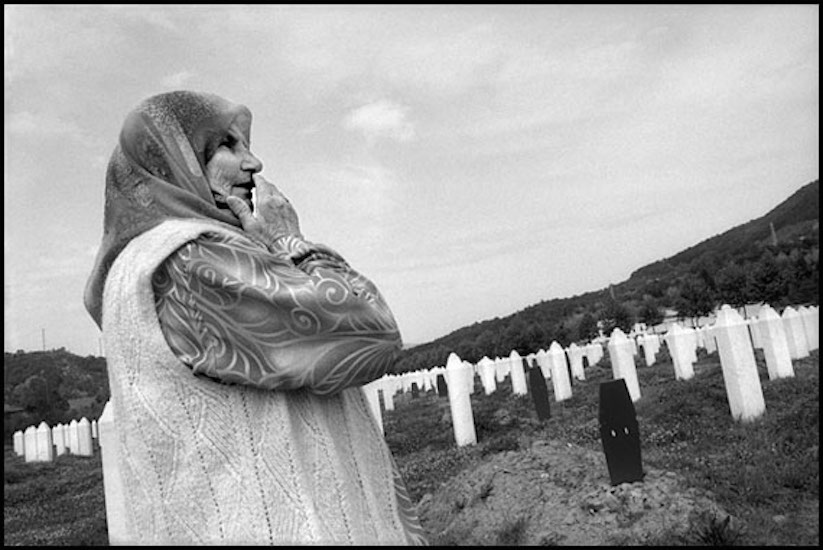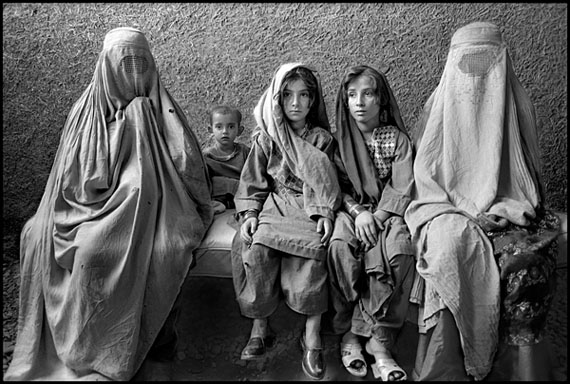
© Marissa Roth - Arifa Osmanovic, Lost 3 sons in the Srebrenica massacre, Potocari, Bosnia and Herzegovina (2009)
Expositions du 15/1/2015 au 12/3/2015 Terminé
Venice arts 1702 Lincoln boulevard CA 90291 Venice États-Unis
http://marissaroth.com/" is pleased to present "One Person Crying: Women and War" at Venice Arts, Venice, California. The exhibition will be accompanied by a documentary film screening series connecting the themes in Roth’s exhibition with powerful stories of women in three different communities as they confront war and its aftermath. Roth will also be teaching an intensive 2-day photography workshop.Venice arts 1702 Lincoln boulevard CA 90291 Venice États-Unis
The topic of Women and War has taken photographer Marissa Roth to many countries and cultures over a time span of 29 years. It began in 1984 with a family trip to the former Yugoslavia, home of her Jewish grandparents - who were murdered by Hungarian Fascists in 1942 - and Pakistan in 1988 with an assignment by the Los Angeles Times to photograph Afghan women refugees. Accompanying a medical mission and photographing refugees in Albania in 1999, she realized that the focus of the immediate and permanent effects of war on women was a recurring theme in her work. In addition to the photographs, the exhibition features the stories of the women portrayed and how the war irrevocably altered their lives.
.jpg)
© Marissa Roth - Lise Kleberger, siege of Berlin survivor, Berlin, Germany (2008)
.jpg)
© Marissa Roth - Six Hibakusha, A-bomb survivors, Hiroshima, Japan (2002)
When humanity is betrayed by madness, war often follows. This project has been about my reconciliation of man’s need for war and the inadvertent upheaval imposed on the women who are directly affected by it. The slow-burning post-war truth that I have learned, is that in the end, war shows up men’s weaknesses and women’s strengths. For men, bravado doesn’t yield easily to admissions of loss or the failed ability to protect their own. Natural caretakers, women pick up the pieces, turning broken lives into replanted gardens. The bridge of anguish is crossed innumerable times from both sides, yet the perspective is always different because of gender roles, cultures and historical context.
I naively believed that war and peace were black and white sociological options. Gradually over the course of this 29-year project, which mirrored the arc of my own maturation process, my world-view palette shattered into a hundred shades of gray. Refusing cynicism, I have learned that war and peace are just words, that in fact it is the invisible thin line between civilization and anarchy, tolerance and intolerance - between 2 people, then 10 people, then a thousand people, then a million people, that predicates constructive coexistence. I’ve read the story of war through the faces of every woman I have met on this project. Their eyes became words strung together in sentences of suffering, imprinted onto sheaths of tears bound together by a common experience, where neither time nor place matters. What matters profoundly to many of them is the universal knowledge that other women, who also survived war, share the same tragic secret of what it feels like to have lived through it.

© Marissa Roth - Afghan women and children refugees, Thal, Pakistan (1988)
Death doesn’t chose sides, but choosing life after war is quite another matter. A number of the women I have met around the world gained impossible strength from their heartache and losses and turned their gaze towards activism, advocating for social justice, peace and teaching tolerance. Their process was not always immediate or easy but came to them slowly as they faced post-war hardship, and healed physical and psychological wounds. I have tried not to take sides in illuminating a conflict, but rather chose to highlight women from all sides in order to tell the story of that particular war. The words are the same whether spoken in Belfast or Bosnia, in English, Hungarian or Cambodian. The women who I have chosen to feature here include activists and the unknown, reflecting the spectrum of women who embody ferocious spirits and quiet strength. Each in their own way chose life and made an indelible impression on me.

